

CloudMinds. Empowering humanity through robotics : Kinova. AI Will Displace 10 Million Jobs — More Than Were Eliminated By The Great Recession. Automation is coming after jobs, from fast food workers to accountants. We analyzed which jobs are most — and least — at risk, given factors including tasks involved, the current commercial deployment of technology, patent activity, regulations, and more. The shift from traditional manufacturing to computer-enabled industry took nearly a century. But the shift from personal computing to billions of smartphones, massive networks, and the IoT has taken just a couple of decades. And the next phase of technological evolution is already underway: advanced neural networks that learn, adapt, and respond to situations. Robots are taking over China's factory floors - Video - Technology. Hanging With the Robot Experts at SXSW Interactive 2016.
It takes a lot to preserve your reputation over the course of centuries, much less geologic periods.
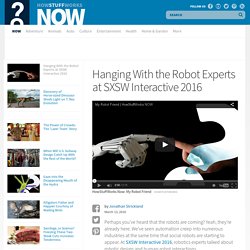
We still talk about Cleopatra and Genghis Khan, but what's more impressive is the awe with which we regard Tyrannosaurus rex, who went extinct 65 million years ago. The dinosaur Tyrannosaurus rex, whose name translates to "tyrant lizard king, was possibly the largest land predator of all time, with a large head and powerful jaws that contained strong, peg-like teeth that could that could crunch through bone in basically the same way we munch pretzel sticks. Now. No, the robots are not about to rise up and destroy us all. Hollywood loves to give us stories of super-intelligent robots running wild with their orders.
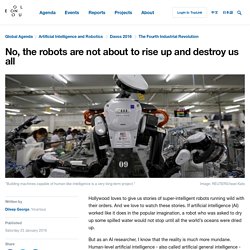
And we love to watch these stories. If artificial intelligence (AI) worked like it does in the popular imagination, a robot who was asked to dry up some spilled water would not stop until all the world’s oceans were dried up. But as an AI researcher, I know that the reality is much more mundane. Human-level artificial intelligence - also called artificial general intelligence - will be created slowly, over a long period of time. And it is very, very unlikely that a robot would ever be smart enough to devise a way to dry the world’s oceans without being smart enough to understand why that would be a problem.
Amazon shipping robots help prepare customer orders - Dec. 1, 2014. The online mega-retailer on Monday unveiled its next-generation fulfillment centers, complete with gigantic robotic arms and machines to help prepare customer orders.
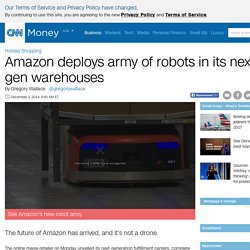
Back-end improvements may never be seen by customers, but will reduce the time between when an order is placed and when it arrives on a doorstep, Amazon said. It may also help prevent the kind of fiasco Amazon suffered last year when many orders weren't delivered in time for Christmas. The 10 higher-tech fulfillment centers will "increase speed of delivery while enabling greater local selection at lower costs for our customers," Amazon senior vice president Dave Clark said in a statement. Related: Where to find Cyber Monday deals. RobotEnomics « Tracking the evolution of Robots. How Technology Is Destroying Jobs. Given his calm and reasoned academic demeanor, it is easy to miss just how provocative Erik Brynjolfsson’s contention really is.
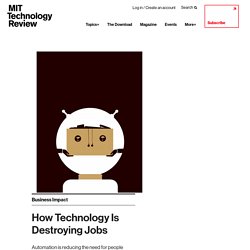
Brynjolfsson, a professor at the MIT Sloan School of Management, and his collaborator and coauthor Andrew McAfee have been arguing for the last year and a half that impressive advances in computer technology—from improved industrial robotics to automated translation services—are largely behind the sluggish employment growth of the last 10 to 15 years. Will humans be replaced by robots? They might take some of our jobs, but they'll also create new ones. Perhaps we should be more welcoming to our mechanical co-workers (Source: Getty)
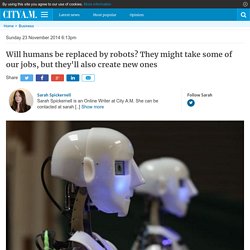
Robots threaten 15m UK jobs, says Bank of England's chief economist. The Bank of England has warned that up to 15m jobs in Britain are at risk of being lost to an age of robots where increasingly sophisticated machines do work that was previously the preserve of humans.
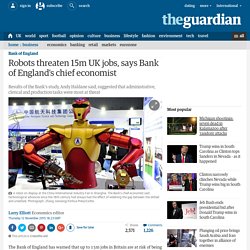
Andy Haldane, the bank’s chief economist, said automation posed a risk to almost half those employed in the UK and that a “third machine age” would hollow out the labour market, widening the gap between rich and poor. The results of a Bank of England study, Haldane added, suggested that administrative, clerical and production tasks were most at threat. In a speech to the umbrella organisation for Britain’s trade unions, the TUC, he asked if the Luddites – reputed to have smashed machines during the Industrial Revolution – had been proved right two centuries on. “Technology appears to be resulting in faster, wider and deeper degrees of hollowing-out than in the past,” he said.
“Why? And labour’s share of the pie could fall even more dramatically than in the past. Smarter robots put 50% of jobs at risk - Nov. 13, 2015. The Bank of England has warned that machines could take over 80 million American and 15 million British jobs over the next 10 to 20 years.
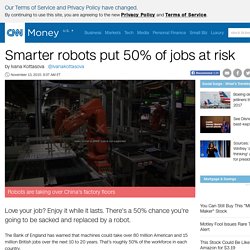
That's roughly 50% of the workforce in each country. As computers become more sophisticated, they are putting jobs previously thought of as "humans only" at risk of automation, the bank's chief economist Andy Haldane said.